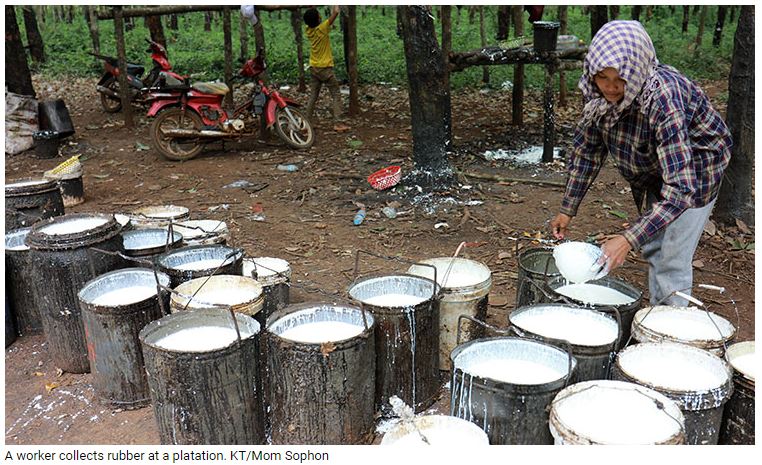Cambodia: Draft rubber law to reach Council of Ministers in 2019
The Ministry of Agriculture is now discussing the Rubber Law with industry players and plans to send a draft to the Council of Ministers for approval next year, according to a high-ranking official.
Pol Sopha, director-general of the General Department of Rubber, said the law is now being discussed at the inter-ministry level, including talks with companies in the industry, and that they are planning workshops to gather input from the private sector and other actors.
“We plan to complete the draft law on rubber in 2019, and will submit it to the Council of Ministers,” Mr Sopha said.
The law now has 11 chapters and 112 articles. According to the draft document, the law aims to ensure an efficient and transparent management of the sector as well as its sustainable development. It will also increase the income of households in the sector and help protect the environment.
“The law aims to control the management of rubber in Cambodia, and will cover all activities involved in rubber harvesting in the Kingdom,” it says.
Lim Heng, vice president of An Mady Group, told Khmer Times that far from boosting the rubber industry, the law will increase the burden on the private sector.
As per the current draft, businesses and investors involved in the rubber sector will have to secure a myriad of licenses before beginning operations. The amount of red tape involved will significantly increase, making it a much longer and arduous process for those interested in entering the market, he said.
“I believe the current draft law will provide little benefit, while increasing the burden on businesses,” Mr Heng said. “If it is approved, no investor will show interest in in the sector.”
“We should not approve this law. Instead, a proper rubber policy to assist farmers and investors needs to be put in place,” he said. “We should not approve a law for the sector until that policy has been established and we have had time to assess its impact on the sector.”
Men Sopheak, president of the Association for Rubber Development of Cambodia, said the law has the potential to be a positive development for all industry actors.
“The government should organise more workshops and consult the private sector,” he said. “This could be a good law if it is not too strict.
“If the law goes into too much detail, it could have a negative impact on those involved in the rubber sector. If we want to amend the law, we would need to go to the Council of Ministers, which could take a very long time,” Mr Sopheak said.
“We should first issue a sub-decree or set up a policy to support the rubber sector, since the situation of the industry is always changing.”
General Department of Rubber’s Mr Sopha, however, said that the law simply provides a foundation, and that it is meant to serve as a guideline. Once passed, it will be enhanced with a series of sub-decress and a strategic plan for the sector to ensure that farmers and businesses are not negatively impacted.
“We will also draft and implement a policy and a strategic plan to develop the rubber sector,” Mr Sopha said. “Those who are fully compliant with the law, will not need to worry. We create laws to help the people, not to increase their burden,” Mr Sopha said.
According to Mr Sopha, Cambodia has more than 436,000 hectares of land cultivated with rubber. The Kingdom will export 220,000 tonnes of rubber this year.
Rubber export prices saw a continuous drop this year following uncertainties created by the US-China trade war and a surplus of rubber in the international market. Rubber prices fell to $1,260 per ton from $1,500 early this year, Mr Sopheak said.
In the last months of 2016, a ton of rubber sold for $1,700, but from January to March of 2017 it traded at $2,200. Prices went down to $1600 in December last year, according to data from the General Directorate of Rubber at the Ministry of Agriculture.
Source: https://www.khmertimeskh.com/50561136/draft-rubber-law-to-reach-council-of-ministers-in-2019/


 English
English




